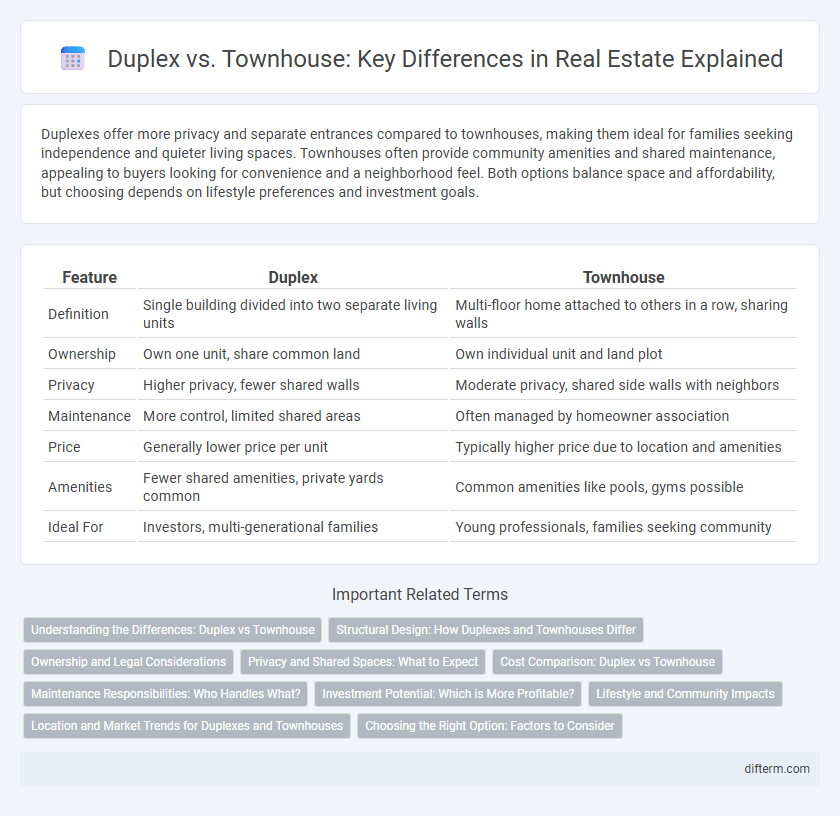Duplexes offer more privacy and separate entrances compared to townhouses, making them ideal for families seeking independence and quieter living spaces. Townhouses often provide community amenities and shared maintenance, appealing to buyers looking for convenience and a neighborhood feel. Both options balance space and affordability, but choosing depends on lifestyle preferences and investment goals.
Table of Comparison
| Feature | Duplex | Townhouse |
|---|---|---|
| Definition | Single building divided into two separate living units | Multi-floor home attached to others in a row, sharing walls |
| Ownership | Own one unit, share common land | Own individual unit and land plot |
| Privacy | Higher privacy, fewer shared walls | Moderate privacy, shared side walls with neighbors |
| Maintenance | More control, limited shared areas | Often managed by homeowner association |
| Price | Generally lower price per unit | Typically higher price due to location and amenities |
| Amenities | Fewer shared amenities, private yards common | Common amenities like pools, gyms possible |
| Ideal For | Investors, multi-generational families | Young professionals, families seeking community |
Understanding the Differences: Duplex vs Townhouse
A duplex is a single building divided into two separate units, often sharing a common wall, while a townhouse is one of a series of attached homes sharing multiple walls within a row or complex. Duplexes typically offer more privacy and larger outdoor spaces compared to townhouses, which emphasize community living and shared amenities. Understanding these differences helps buyers determine which property type aligns better with their lifestyle, investment goals, and maintenance preferences.
Structural Design: How Duplexes and Townhouses Differ
Duplexes feature two separate living units sharing a common wall but often have distinct entrances and separate outdoor spaces, providing more privacy and independent structural systems. Townhouses, typically arranged in a row with three or more units, share both walls and uniform rooflines, creating a continuous architectural design with less separation between units. The structural design of duplexes allows for greater customization and individual maintenance, whereas townhouses emphasize cohesive community aesthetics and space efficiency.
Ownership and Legal Considerations
Duplex ownership typically involves owning a single property divided into two units under one title, granting full control and responsibility for the entire building, while townhouses are usually part of a homeowners association (HOA) with shared ownership of common areas and adherence to HOA rules. Legal considerations for duplexes often include zoning laws, property taxes assessed on the whole structure, and potential rental regulations if one unit is leased. Townhouse owners must navigate HOA bylaws, monthly fees, and restrictions on modifications, impacting their autonomy and legal obligations differently than duplex owners.
Privacy and Shared Spaces: What to Expect
Duplexes typically offer more privacy with only one shared wall between units, reducing noise and direct neighbor interactions. Townhouses often have multiple shared walls and common areas, such as driveways or yards, resulting in more frequent contact with neighbors. Understanding these differences helps buyers prioritize their privacy preferences and lifestyle needs when choosing between the two property types.
Cost Comparison: Duplex vs Townhouse
Duplexes generally have a lower purchase price compared to townhouses due to shared land costs and simpler construction. Townhouses often come with higher homeowners association fees covering maintenance and amenities, which can increase ongoing expenses. When evaluating long-term affordability, duplex owners may benefit from rental income potential that offsets mortgage payments, unlike most townhouse setups.
Maintenance Responsibilities: Who Handles What?
In real estate, maintenance responsibilities differ notably between duplexes and townhouses. Duplex owners typically manage both the interior and exterior upkeep of their specific units, including the yard and roof, since these properties are individually owned. Townhouse residents often share exterior maintenance tasks like landscaping and building repairs through a homeowners association (HOA), which collects fees to handle these common areas and structural elements.
Investment Potential: Which is More Profitable?
Duplex properties often provide higher rental income potential due to dual living units, attracting investors looking for steady cash flow and diversified tenant risk. Townhouses tend to appreciate faster in urban markets because of limited land availability and homeowner association benefits, appealing to long-term capital gain investors. Evaluating local market trends and investment goals is crucial to determine whether a duplex's income generation or a townhouse's equity growth offers greater profitability.
Lifestyle and Community Impacts
Duplexes often provide greater privacy and space between neighbors, fostering a quieter lifestyle that appeals to families seeking a suburban environment. Townhouses, with shared walls and close proximity, encourage stronger community interactions and blend convenience with urban living. Both options influence neighborhood dynamics and social engagement differently, shaping residents' daily experiences and community bonds.
Location and Market Trends for Duplexes and Townhouses
Duplexes tend to be found in suburban areas with moderate density, appealing to buyers seeking affordability and multi-generational living options, while townhouses are more common in urban and rapidly developing neighborhoods that cater to professionals desiring proximity to city amenities. Current market trends show increasing demand for townhouses due to urbanization and the desire for low-maintenance living, whereas duplexes maintain steady popularity in regions with zoning laws favoring multifamily properties. Location drives pricing dynamics, with townhouses often commanding higher prices in metropolitan markets compared to duplexes, which offer competitive alternatives in emerging suburban zones.
Choosing the Right Option: Factors to Consider
When choosing between a duplex and a townhouse, consider factors such as privacy, maintenance responsibilities, and property value appreciation. Duplexes often offer more privacy with fewer shared walls, while townhouses provide community amenities and lower upkeep due to homeowner association management. Location, budget, and long-term investment goals play crucial roles in determining the best fit for individual lifestyle and financial plans.
duplex vs townhouse Infographic

 difterm.com
difterm.com